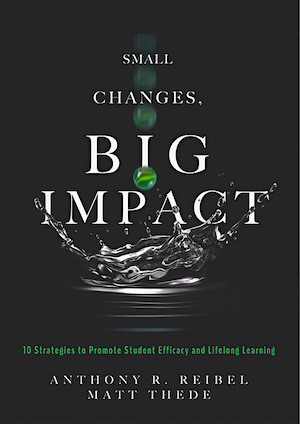Promote Student Efficacy and Lifelong Learning
Small Changes, Big Impact: 10 Strategies to Promote Student Efficacy and Lifelong Learning
By Anthony R. Reibel and Matt Thede
(Solution Tree Press, 2020 – Learn more)
Reviewed by Kristen Donnelly

In the book Small Changes, Big Impact: 10 Strategies to Promote Student Efficacy and Lifelong Learning, authors Anthony R. Reibel and Matt Thede suggest making a series of 10 changes in the way we think about teaching, learning and student success – changes that will put the focus on students’ entire learning journey rather than how they did on a single assignment.
Impacting a school’s learning culture

Overall, I believe the authors did a good job in explaining each change and its importance in creating an overall culture of student efficacy and agencies.
Each chapter includes an explanation of a change, practical steps and strategies to carry out this change, with “Big Impact Recommendations” suggested at the end.
One strength of the book is the inclusion of many examples, charts and diagrams to further illustrate each point along with several reproducible pages to be used by teachers and administrators.
Recommended changes I can make in my classroom
While I felt the overall book was written with school leadership in mind, there were some things that I could take away for classroom application. For example, Change #3, “Organize Curriculum Around Skills, Not Content,” is something I could see carrying out. For this change, Reibel and Thede recommend building a curriculum around skill development and suggest that each skill be presented with proficiency levels that allow students to see exactly what they need to do to succeed.
I also envision using “Student Centered Rubrics” (Change #4) in my classroom. Reibel and Thede posit that rubrics that include elements of student reflection as well as opportunities to show skill improvement through proficiency gradation will ultimately improve student growth and encourage personal efficacy.
These types of rubrics tell students not only what to do, but provide opportunities to discuss how well they are doing it. If I could incorporate these rubrics into my classroom, then maybe it would lead to more consistent improvement over time, as well as more opportunities to give (and get) valuable feedback to make sure that my students are really making progress.
Beyond small changes
There were other parts of the book that I felt weren’t “small changes” like the title would suggest. For example, Change #1, “Redefining Student Success,” and Change #2, “Create Student Centered Mission Statements,” are interesting to read about, but in my opinion are rather large scale changes to the school that involve many conversations and a lot of intentional planning.
If a reader was hoping to find small changes they could easily implement in the classroom next month, this would not be the book for them. In fact, the authors do mention that it took one school three years to implement all ten changes recommended in the book.
If I were to have a conversation with the authors, I would be curious about roadblocks they faced while implementing the changes, whatever their size. They did acknowledge that their proposed changes were not universally loved by all, so I would be fascinated to learn more about the processes they used to get teachers, students and parents onboard.
Helping students take charge of their learning
After finishing this book, I felt very inspired and began rethinking my current teaching practices. You may not agree with every change suggested (I certainly questioned a few), but I would recommend this book to teachers and administrators who are ready to be challenged to create a community of intrinsically motivated students who take charge of their own learning.
Kristen Donnelly teaches middle school history at Austin Prep in Reading, MA. She received her a B.A. in history with a focus on American History from Framingham State University and a M.Ed. with a focus on middle school education from Salem State University. An avid traveler, Kristen uses her vacations to explore new places and uses her experiences to bring her world history and civics curriculum to life.






























